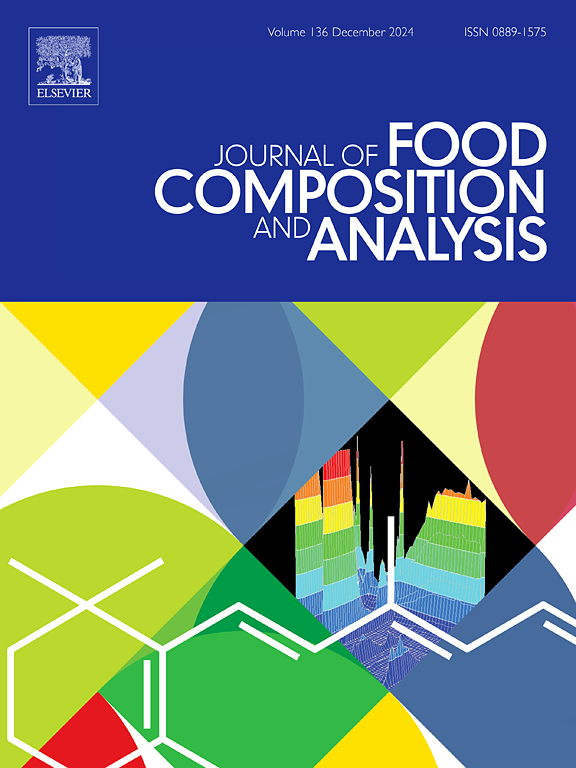基于多重聚合酶链反应的三重侧流条带检测法,用于同时检测掺假肉中的鸡肉、猪肉和鸭肉
IF 4
2区 农林科学
Q2 CHEMISTRY, APPLIED
引用次数: 0
摘要
日益严重的肉类掺假问题严重威胁着消费者的健康和经济秩序。因此,开发一种高效、低成本的多物种检测方法对于克服单一靶标、低效、高成本等缺点至关重要。本研究提出了一种新型的多重聚合酶链反应(MPCR)-三重侧向流带(TLFS)集成方法,可同时定量检测掺假肉样品中的鸡、鸭和猪肉成分。与针对单一物种或需要复杂仪器的传统方法不同,该方法独特地将 MPCR 与 TLFS 结合在一起,一次运行即可检测多个物种,大大减少了检测时间和成本。该方法使用 MPCR 扩增三种目标肉类的特异性基因,并通过荧光团(6-Fam、Cy5 和地高辛)将其区分开来。TLFS 由三个独立的泳道组成,每个泳道特异于一个目标肉类扩增子(鸡肉、鸭肉或猪肉),可同时检测来自单一输入样本的所有三种肉类。这种设置可通过测量每个泳道的信号强度对混合肉类样品中的每个物种进行定量,从而在一次运行中提供物种特异性定量。MPCR 扩增子通过抗原抗体结合与 TLFS 兼容。通过优化反应条件,该方法显示出良好的特异性、灵敏度和稳定性。三个目标肉类(鸡肉、鸭肉和猪肉)没有交叉检测,其他七个目标肉类(马肉、牛肉、羊肉、骆驼肉、火鸡肉、鹅肉和兔肉)没有假阳性。鸡肉、鸭肉和猪肉的检出限分别低至 0.1 %、0.5 % 和 0.05 %(重量百分比),均低于中国国家标准(GB/T 38164-2019)规定的 1 % 检出限。在 TLFS 检测中,肉类样品可在 1 分钟内定性,7 分钟后定量。商业样品的检测结果表明,该方法与国家标准方法的检测结果一致,证明了该方法的可靠性和实用性。本文章由计算机程序翻译,如有差异,请以英文原文为准。
A triple lateral flow strip assay based on multiplex polymerase chain reaction for simultaneous detection of chicken, pork and duck in adulterated meat
The increasing problem of meat adulteration significantly threatens consumer health and economic order. Therefore, developing an efficient and low-cost method for multi-species detection is essential to overcome the disadvantages of single-targeted, low-efficiency, and high-cost methods. This study presents a novel multiplex polymerase chain reaction (MPCR)-triple lateral flow strip (TLFS) integrated method, which enables the simultaneous, quantitative detection of chicken, duck, and pork ingredients in adulterated meat samples. Unlike traditional methods that target single species or require complex instrumentation, this method uniquely combines MPCR with TLFS to detect multiple species in one run, significantly reducing detection time and cost. This method uses MPCR to amplify genes specific to the three target types of meat and differentiate them by fluorophores (6-Fam, Cy5, and Digoxin). The TLFS consists of three separate lanes, each specific to one target meat amplicon (chicken, duck, or pork), allowing for the simultaneous detection of all three species from a single input sample. This setup enables the quantification of each species within a mixed meat sample by measuring the signal intensity from each lane, thus providing species-specific quantification in one run. MPCR amplicons are compatible with TLFS via antigen-antibody binding. By optimizing the reaction conditions, the method demonstrated good specificity, sensitivity, and stability. There were no cross-detections for three target meats (chicken, duck, and pork) and no false positives for seven others (horse, beef, lamb, camel, turkey, goose, and rabbit). The detection limit for chicken, duck, and pork species was low to 0.1 %, 0.5 %, and 0.05 % (wt%), respectively, which are all lower than the 1 % detection limit specified by the Chinese National Standard (GB/T 38164–2019). In the TLFS detection, meat samples can be qualified at 1 min and quantified after 7 min. The results of commercial samples showed that the method was consistent with the results of the national standard method, proving its reliability and practicality.
求助全文
通过发布文献求助,成功后即可免费获取论文全文。
去求助
来源期刊

Journal of Food Composition and Analysis
工程技术-食品科技
CiteScore
6.20
自引率
11.60%
发文量
601
审稿时长
53 days
期刊介绍:
The Journal of Food Composition and Analysis publishes manuscripts on scientific aspects of data on the chemical composition of human foods, with particular emphasis on actual data on composition of foods; analytical methods; studies on the manipulation, storage, distribution and use of food composition data; and studies on the statistics, use and distribution of such data and data systems. The Journal''s basis is nutrient composition, with increasing emphasis on bioactive non-nutrient and anti-nutrient components. Papers must provide sufficient description of the food samples, analytical methods, quality control procedures and statistical treatments of the data to permit the end users of the food composition data to evaluate the appropriateness of such data in their projects.
The Journal does not publish papers on: microbiological compounds; sensory quality; aromatics/volatiles in food and wine; essential oils; organoleptic characteristics of food; physical properties; or clinical papers and pharmacology-related papers.
 求助内容:
求助内容: 应助结果提醒方式:
应助结果提醒方式:


